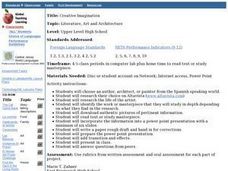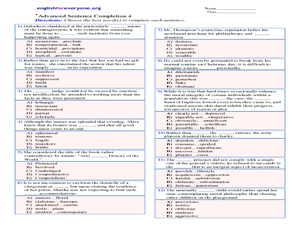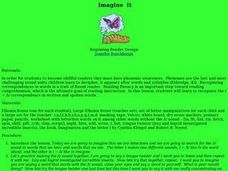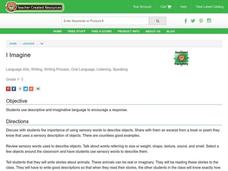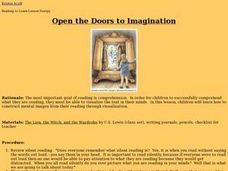Curated OER
Learning About Phrases To Improve Fluency And Comprehension
Investigate the concept of phrases and how they are a crucial element for successful reading comprehension. High schoolers identify key phrases in reading selections. Afterward, they engage in writing exercises regarding what they have...
Curated OER
Classroom Fun with Flat Stanley
Complete a series of activities based on the Flat Stanley books in this literature study lesson. Introduce the book with a discussion of supernatural qualities, then studentscan create character webs, write news articles, build kites and...
Curated OER
Remembering Waiting
After a close study of the pastel drawing Waiting by Edgar Degas have the class imagine the story Degas may be telling through the body language and clothing of the people in the work of art. Your young writers then create a drawing...
Curated OER
Breaching the Gulf Between Cultures
Learners explore the dynamics, the challenges, and the rewards of adjusting to a new culture through the reading of "Help! My Father is Coming" and "The Visit to Vijay's". In this social culture lesson, students carousel brainstorm about...
Curated OER
Coming to Terms With Cultural Differences
Students consider cultural differences. In this Peace Corps instructional activity, students read "Help, My Father is Coming," by Jim Toner and then write journal entries about the culture of Sri Lanka.
Curated OER
The Diamond as Big as the Ritz Quiz
Can you imagine an entire mountain consisting of a solid diamond? It is possible, though a bit farfetched in The Diamond as Big as the Ritz by F. Scott Fitzgerald. The story is meant to be a satire about wealth and greed; the quiz asks...
Curated OER
Rights and Responsibilities
Discuss the differences between rights and responsibilities with your class. Various topics are covered in relation to how each is a right or a responsibility, then several thinking questions are posed. Use to start a class discussion or...
Curated OER
100 Hungry Ants
After hearing the story, One Hundred Angry Ants, learners apply what they have seen to a math challenge. They choose one of three numbers: 12, 24, or 36. Imagining this were the number of ants going to a picnic, they consider how many...
Curated OER
Spanish Artists in Powerpoint
Students select a Spanish author, architect, or painter to research. After composing a rough draft for teacher review, the give Powerpoint presentations to the class. Students answer questions from peers.
Curated OER
Rendering a Resolution
Students explore the concept of peace. In this International Peace Day lesson plan, students determine their reaction to a scenario that requires them to benefit themselves or benefit everyone. Students discuss the scenario and discuss...
Curated OER
Letters Home
Students read a short biography of Jacob Early, a member of the Ohio Volunteer Infantry in 1862. In this Civil War lesson, students rewrite a letter written by him, editing for spelling, grammar and punctuation. Students further discuss...
Curated OER
Advanced Sentence Completion 2
In this sentence completion worksheet, students read the sentences and select the best word or words to complete the 12 sentences.
Curated OER
Advanced Sentence Completion 4
In this sentence completion worksheet, students choose the best word(s) to complete twelve sentences. Students must fill in more than one word per sentence in some instances.
Curated OER
Beginning Sentence Completion 13
In this sentence completion worksheet, students read the sentences and choose the best word to complete each sentence. Students complete 12 sentences.
Curated OER
Imagine It
Pupils become skillful readers by assessing phonemic awareness and deciphering the words and syllables that follow challenging sounds. This lesson emphasizes the correspondence dealing with the i=/i/ in written and spoken words.
Curated OER
Drawing Into the Imagination
Sixth graders create a non linear story with multiple possibilities and endings. In this non linear story lesson plan, 6th graders research non linear stories, create their own, and illustrate it.
Curated OER
I Imagine
Students discuss the importance of using sensory words to describe objects; talking about words that refer to size, shape, texture, sound, smell, etc. They select a few objects around the classroom and use sensory words to describe.
Curated OER
Imagining Your Science Fiction Short Story
Twelfth graders brainstorm ideas for their own science fiction story. Using worksheets, they sketch the plot and setting for their story. They create appropriate characters and develop their interactions among each other. They share...
Curated OER
Explore, Analyze and Imagine: The Importance of Body Language
Students develop characters and role-play. In this character portrayal lesson, students analyze the importance of body language, develop a character to portray and interview another students character.
Curated OER
Open the Doors to Imagination
Students practice visualizing what they read and hear in a text. They listen to selected passages from The Lion, the Witch, and the Wardrobe read by the instructor. Students discuss the visual pictures they see when listening to the...
Curated OER
Fourth Grade Writing Lesson #1/ Narrative Prompt
Fourth graders produce narrative about a personal experience, with a focus on the trait of organization.
Curated OER
Create a Pet/Monster Creative Writing Activity
Students are instructed to create a monster in a paragraph or even a short story. This activity allows students to work with new vocabulary. It is also a good way to practice using verbs and adjectives in Spanish.
Curated OER
Arthur's New Puppy Directed Reading Lesson (Elementary, Reading/Writing)
Students listen and take part as teacher and classmates give a definition and examples of responsibility, then brainstorm what Arthur needs to do to prepare for his puppy's arrival. The story be read as a total group and then talked about.
Curated OER
Reading and Writing Practice
Students read a magazine article about the advantages and disadvantages of teleworking. They answer questions about the article to test their comprehension. They identify parts of each sentence.










